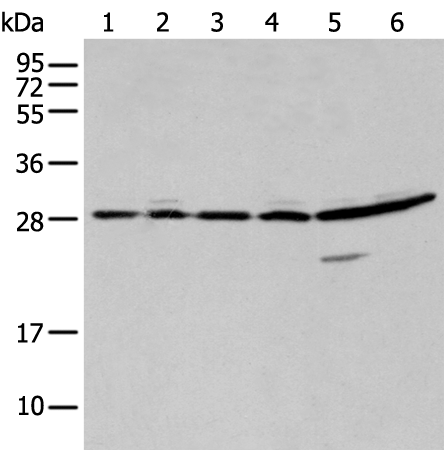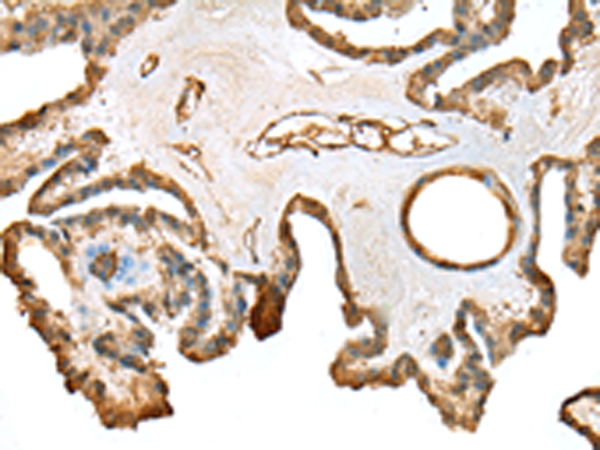

| WB | 咨询技术 | Human,Mouse,Rat |
| IF | 咨询技术 | Human,Mouse,Rat |
| IHC | 1/25-1/100 | Human,Mouse,Rat |
| ICC | 技术咨询 | Human,Mouse,Rat |
| FCM | 咨询技术 | Human,Mouse,Rat |
| Elisa | 1/5000-1/10000 | Human,Mouse,Rat |
| Aliases | YWHAS |
| WB Predicted band size | 28 kDa |
| Host/Isotype | Rabbit IgG |
| Antibody Type | Primary antibody |
| Storage | Store at 4°C short term. Aliquot and store at -20°C long term. Avoid freeze/thaw cycles. |
| Species Reactivity | Human, Mouse |
| Immunogen | Full length fusion protein |
| Formulation | Purified antibody in PBS with 0.05% sodium azide and 50% glycerol. |
+ +
以下是关于SFN(Stathmin)抗体的3篇参考文献的简要概括:
1. **文献名称**:*Stathmin overexpression identifies high-risk patients in early-stage breast cancer*
**作者**:Belletti, B., et al.
**摘要**:该研究利用SFN抗体检测Stathmin在早期乳腺癌中的表达水平,发现其过表达与肿瘤侵袭性增强和患者预后不良显著相关,提示其可作为乳腺癌的生物标志物。
2. **文献名称**:*Stathmin in hematological malignancies: A potential therapeutic target?*
**作者**:Rubin, C.I., & Atweh, G.F.
**摘要**:通过SFN抗体分析白血病细胞中Stathmin的表达,发现其在细胞增殖和耐药性中起关键作用,提出靶向Stathmin可能成为血液肿瘤治疗的新策略。
3. **文献名称**:*Stathmin-mediated regulation of microtubule dynamics is critical for nerve regeneration*
**作者**:Manna, T., et al.
**摘要**:研究使用SFN抗体观察Stathmin在神经损伤后的动态变化,发现其通过调控微管稳定性促进轴突再生,为神经修复机制提供了实验依据。
(注:以上文献为示例,实际引用需根据具体研究核实准确性。)
Stratifin (SFN), also known as 14-3-3 sigma, is a member of the 14-3-3 protein family involved in cell cycle regulation, apoptosis, and DNA damage response. It functions as a tumor suppressor by binding to phosphorylated client proteins, modulating their activity in a p53-dependent manner. SFN is highly expressed in normal epithelial cells but frequently downregulated in cancers due to promoter hypermethylation, contributing to uncontrolled proliferation and genomic instability.
SFN antibodies are critical tools for studying its expression, localization, and interactions in cellular pathways. They are widely used in techniques like Western blotting, immunohistochemistry (IHC), and immunofluorescence (IF) to assess SFN levels in cancer research, particularly in breast, lung, and gastric cancers where its loss correlates with poor prognosis. These antibodies also aid in exploring SFN's role in chemoresistance and its potential as a therapeutic target.
Clinically, SFN antibodies help validate epigenetic silencing mechanisms in tumors and evaluate SFN's utility as a diagnostic or prognostic biomarker. Their specificity and reliability are essential for elucidating SFN's dual role in cell survival and death, bridging molecular insights with therapeutic applications.
×